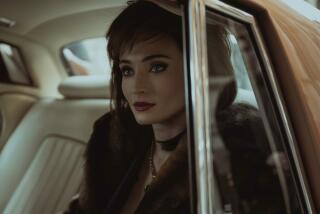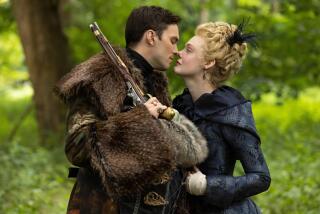JOAN VS. PETER IN BATTLE OF THE NETWORK GREATS
C rrrrrunch!
Sunday begins the battle of the blockbusters, pitting Joan the Great on CBS against “Peter the Great” on NBC with a little help from Cosby the Great.
Still hoping to recapture the Nielsen lead from NBC, once-dominant CBS is plunging Joan Collins coif-first into the critical February ratings sweeps that will set the advertising fees charged by nearly all stations until summer.
“Dynasty” star Collins is the big cheese in the seven-hour, three-part “Sins,” premiering at 8 p.m. Sunday on Channels 2 and 8. The opposition is head-turning “Peter the Great,” an eight-hour, four-parter debuting 60 minutes later on Channels 4, 36 and 39.
NBC was worried about CBS’s lower-brow “Sins” getting an hour jump and an insurmountable ratings lead on historic “Peter the Great.” So it gave its $29.2-million biography a boffo lead-in by shifting an episode of its sizzling comedy “The Cosby Show” to 8 p.m. Sunday and pushing back “Amazing Stories” to 8:30.
Nice try. When it comes to getting laughs, though, even hilarious Bill Cosby is no match for “Sins” and Joan Collins.
Based on a novel by Judith Gold (a pseudonym for two male authors) and snazzily filmed in Europe, “Sins” stars Collins as fictional Parisian Helene Junot, who sheds her poverty to become the hated head of an international fashion magazine empire.
“Sins” is so relentlessly stupid that it’s simply irresistible. When Helene’s aristocratic boyfriend (Jean Pierre Aumont) throws whiskey into the face of his drunken, lecherous offspring (Neil Dickson) and says, “I’m ashamed to call you my son,” you know you’ve reached trash heaven.
In the finest traditions of “Hollywood Wives” and “Lace I” and “Lace II,” this is TV at its wonderful worst. Laurence Heath’s exquisitely bungled script explores the always electrifying combo of Paris high fashion and Nazi war crimes while rolling out cliches like soda bottles on a production line.
“I’m not going to share you, David,” Helene tells another boy friend (James Farentino). “I cahn’t . I cahn’t .”
“You’re more beautiful every time I see you,” he tells her later. “What I want to do is take you into my arms. What I want to do is take you to bed.”
And he cahn .
Helene is so successful that nearly everyone despises her, including a snarling ex-Nazi (Steven Berkoff) who had her mother killed and who persecuted her long-lost brother (Timothy Dalton); an Italian con man (Giancarlo Giannini); and an architect (Lauren Hutton) whose husband (Joseph Bologna) Helene steals.
This is fashion chic stories where the clothes wear the people. But Collins, who is executive producer with her husband, Peter Holm, wears more on her face than most people do on their backs. It would take an archeological dig to find the skin beneath her makeup.
Actually, there are two Helenes. The British Collins plays the mature Helene inexplicably as a Frenchwoman with a British accent. Canadian Catherine Mary Stewart (who looks nothing like Collins) plays the junior Helene until her late teens--also with a British accent. In other words, although playing a French character, Stewart has to affect a British accent to be consistent with Collins’ British-sounding portrayal of a Frenchwoman. All right !
Meanwhile, Helene is stalked by a killer dog, and the Italian con man complains at a lavish party that “the caviar is black. I asked for gold caviar. Spray it!”
It’s that kind of show.
Give or take a few hundred hangings, beheadings and hackings, a bloody revolt and a plot on Peter’s life by his half-sister, Sophia, “Peter the Great” is pretty bland compared with “Sins.”
Filmed in the Soviet Union and Austria, “Peter the Great” is just about the grandest-looking production ever made for American TV. It’s so gorgeously staged that each of Oscar-winning cinematographer Vittorio Storaro’s pictures --from the czar’s candle-lit chambers to Russia’s onion-domed towers--looks like a framed work in a gallery. What an awesome effort.
Yet--despite Maxmilian Schell’s captivating, possessed, soulful Peter--most of the eight hours offer more spectacle than substance. Such international performers as Omar Sharif, Hanna Schygulla, Helmut Griem and Vanessa Redgrave show up in supporting roles, but only Redgrave is memorable as the hard, hateful Sophia.
Based on Robert K. Massie’s Pulitzer Prize-winning biography, “Peter the Great” unevenly traces the 42-year reign of probably the greatest of all czars. The dynamic autocrat’s uncompromising, roughshod and even savage Westernization of his relatively primitive nation made him many enemies but ultimately led to a Russian cultural revolution that was to enrich the world. So determined was Peter to shed Russia’s rustic past that he taxed even the church to finance his dream and turned church bells into cannon.
At its best, “Peter the Great” is an eye-opener showing America that “Rocky IV” is not the definitive work on our traditional enemy, that the largest, most influential republic in the Soviet Union has a rich and fascinating past that bears telling and retelling.
Nor is “Peter the Great” the last word either.
It didn’t help that the company was beset by such internal battling that producer-director Lawrence Schiller was replaced by Marvin J. Chomsky after completing almost a fourth of the shooting. Beyond that, however, the work on the screen is often as one-dimensional dramatically and historically as it is magnificent to behold, with the full scope of Peter’s enormous reforms and their impact on Russia only sketchily explored.
Edward Anhalt’s script frequently fibs, moreover, such as depicting a young Peter being saved from an assassin by his future friend, Alexander Menshikov, in Episode One. The rescue never happened. The producers have said they regard their docudrama as entertainment, not history. When it strays into fiction, though, viewers deserve to be told.
Then, too, the real Peter was 6-foot-7, compared with the much shorter Jan Niklas as the younger Errol Flynn-like czar and Schell as the older Peter.
Actually, just as there are two Helene Junots in “Sins,” there are three adult Peters in “Peter the Great.” Besides Niklas and Schell, there is a so-called look-alike who doubled for Schell after the Austrian-born actor had departed near the end of the miniseries because of a schedule conflict.
Chomsky vows that his Schell game works, that viewers will be unable to tell the phony Schell from the real Schell in final scenes where Peter is mysteriously shown only in the shadowy background. Chomsky is wrong.
The sins of Peter.
More to Read
The complete guide to home viewing
Get Screen Gab for everything about the TV shows and streaming movies everyone’s talking about.
You may occasionally receive promotional content from the Los Angeles Times.






